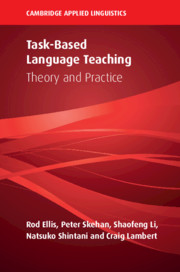Book contents
- Task-Based Language Teaching
- The Cambridge Applied Linguistics Series
- Task-Based Language Teaching
- Copyright page
- Contents
- Figures
- Tables
- Series Editors’ Preface
- Authors’ Preface
- Part I Introduction
- Part II Theoretical Perspectives
- 2 Cognitive-Interactionist Perspectives
- 3 Psycholinguistic Perspectives
- 4 Sociocultural Perspectives
- 5 Psychological Perspectives
- 6 Educational Perspectives
- Part III Pedagogical Perspectives
- Part IV Investigating Task-Based Programmes
- Part V Moving Forward
- Endnotes
- References
- Index
6 - Educational Perspectives
from Part II - Theoretical Perspectives
Published online by Cambridge University Press: 07 October 2019
- Task-Based Language Teaching
- The Cambridge Applied Linguistics Series
- Task-Based Language Teaching
- Copyright page
- Contents
- Figures
- Tables
- Series Editors’ Preface
- Authors’ Preface
- Part I Introduction
- Part II Theoretical Perspectives
- 2 Cognitive-Interactionist Perspectives
- 3 Psycholinguistic Perspectives
- 4 Sociocultural Perspectives
- 5 Psychological Perspectives
- 6 Educational Perspectives
- Part III Pedagogical Perspectives
- Part IV Investigating Task-Based Programmes
- Part V Moving Forward
- Endnotes
- References
- Index
Summary
Chapter 6 presents an educational perspective on TBLT. The chapter begins by summarizing general educational theories that support an approach to learning that emphasizes experience and ‘doing’ over knowing and ‘telling’ - such as that of Dewey (1938) - and recent work on complex skill acquisition and training. It then considers research that draws on educational accounts of the role of ‘engagement’ in task performance and learning and the importance of investigating learners’ perceptions of the tasks they perform as well as their actual performance.
Keywords
- Type
- Chapter
- Information
- Task-Based Language TeachingTheory and Practice, pp. 155 - 174Publisher: Cambridge University PressPrint publication year: 2019

